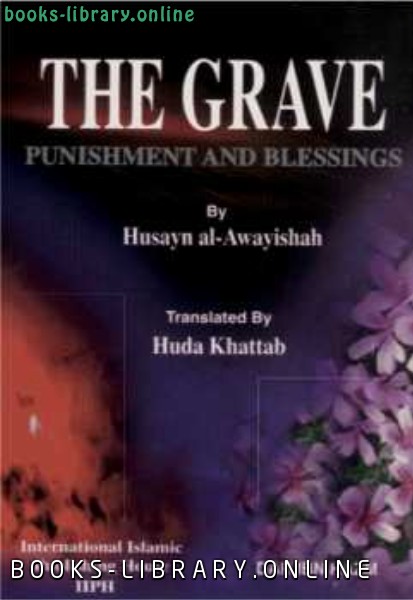📘 قراءة كتاب The Grave Punishments and Blessings أونلاين


NOTE ON ABBREVIATIONS:
.
The following abbreviations are used in this book:
SWT- Subhanahu wa Ta’ala (May He be glorified
and exalted).
SAAS-Sall-Allahu ’Alayhi wa Sallam (May Allah
bless him and grant him peace).
RA-Radi Allahu 'Anhu (May Allah be pleased with
him) Radi Allahu ’Anha (May Allah be pleased with
her) Radi Allahu ’Anhum (May Allah be pleased
with them).
AS-’Alayhis-Salam (Peace be upon him) ’Alayhim
al-Salam (Peace be upon them).
NOTE ON TRANSLATION
OF
QUR’ANIC QUOTATIONS:
The translations of quotations from the Holy Qur’an
are adapted from the Translation and Commentary
by A. Yusuf Ali (1983 edition, published by Amana
Corp, U.S.A.). The adaptations are:
1- The archaic style of English used by Yusuf Ali has
been updated, i.e. the the pronouns such as «thou»,
«ye», have been amended to «you». Verbs have been
amended accordingly, so that «goeth» becomes
«goes». etc.
2- The word «God» has been replaced with the word
«Allah».
AUTHOR’S PREFACE
Praise be to Allah: we praise Him and seek His help
and forgiveness. We seek refuge with Him from the
evils of our own souls and deeds. Whomever Allah
(SWT) guides, no-one can lead astray, and whomever
He leaves astray, no-one can guide. I bear witness
that there is no god but Allah (SWT) Alone Who has
no partner, and I bear witness that Muhammad is
His Slave and Messenger.
.As a continuation of the
Bidayal aJ-Salikin series,
Al
lah (SWT) has enabled me to produce this book.
The
G rave-Punishm ent and Blessings.
1 believe that it
was necessary to present this information to my Mus
lim brothers, because the punishments and blessings
of the grave are topics which have to do with ’Aqi-
dah, topics which we must know about. The pillars
of Iman, the punishments and blessings of the grave,
the punishments of Hell and the blessings of Para
dise... knowing and believing in all these lead to the
reform of the heart, which in turn will lead to the re-
9
form of the external aspects of life, including the cor
rection of morals on which a safe and secure life for
society as a whole, and indeed the entire Ummah,
may be built.
For we
know that the cause of corruption, whether
on an individual or group basis, is the lack of a de
terrent. The greatest deterrent is belief in Allah
(SWT) and in the knowledge that He sees ail that we
do, in private or in public, in secret
ot
in the open;
and belief in the angels, and in the blessings and pun
ishment of the grave; and belief in Paradise and
Hell... and in all the other things which must be be
lieved in.
Before the believer says or does anything, he must
weigh it up, bearing in mind his consciousness of Al
lah (SWT), Hell and Paradise, and the blessings and
punishment of the grave. Thus the believer should do
nothing but good; but if he does or says something
that does not befit him, then he will fed as if the pun
ishment of the grave and Hell is closer to him than
the soles of his own feet, and he will not feel at peace
until he has asked Allah (SWT) for forgiveness for
i
his sins, repented to Him and returned to Him, weep
ing, with humility and regret.
Filled with these good beliefs, the early Muslims con
quered the world. But because of our ignorance of
these same momentous beliefs, our Ummah has lost
its highest morals and ethics; we have lost our happi
ness, stability and security; we have lost the brotherly
love between one another, and we have forgotten
about Jihad and making sacrifices for the sake of Al
lah (SWT). This has encouraged our enemies, who
call one another to attack us like people calling one
another to eat from a communal pot. We have lost
so much in this world, yet losing out in the Hereafter
will be even worse. But this Din of ours is the torch
of guidance which lights the way for the Ummah and
for those seeking the way to Allah (SWT
It revives
hearts and joins them together, and banishes hatred
and enmity. It restores honour and happiness-but
only if we adhere to it properly. «... Is there any that
will receive admonition?» [al-Qamar 54:15].
1 1
I cannot thank enough all those who offered help
t
and assistance in the preparation of this book, espe
cially my shaykh, Muhammad Nasir al-Din al-Alba-
ni, who let me consult his not-yet-published book,
Sahih al-Targhib wa’J-TarhJb,
to use for my research.
May Allah (SWT) reward him with good.
We ask Allah (SWT) to make this book purely for
His sake. May He accept it from me, and may He
protect me and my brothers in Islam from the pun
ishments of the grave and Hell-fire, and bestow upon
us the blessings of the grave and Paradise. We ask
Him for the good things in this world and the next.
Verily He is able to do all things
Islam tells us what we can expect when we have finally made our exit from this world we are also given ample guidance as to how we may best prepare ourselves and earn the rewards of Paradise in the Hereafter. In this book the author outlines the Islamic teaching on death and the grave. It is an essential reading for any Muslim who wants to know more about the topic from the authentic sources of Islam.
سنة النشر : 1998م / 1419هـ .
حجم الكتاب عند التحميل : 54.6 ميجا بايت .
نوع الكتاب : pdf.
عداد القراءة:
اذا اعجبك الكتاب فضلاً اضغط على أعجبني و يمكنك تحميله من هنا:

شكرًا لمساهمتكم
شكراً لمساهمتكم معنا في الإرتقاء بمستوى المكتبة ، يمكنكم االتبليغ عن اخطاء او سوء اختيار للكتب وتصنيفها ومحتواها ، أو كتاب يُمنع نشره ، او محمي بحقوق طبع ونشر ، فضلاً قم بالتبليغ عن الكتاب المُخالف:
 قبل تحميل الكتاب ..
قبل تحميل الكتاب ..
يجب ان يتوفر لديكم برنامج تشغيل وقراءة ملفات pdf
يمكن تحميلة من هنا 'http://get.adobe.com/reader/'
دار النشر الإسلامية العالمية
 ❰ ناشرين لمجموعة من المؤلفات أبرزها ❞ The Grave Punishments and Blessings ❝ ❞ Muhammad`s Prohethood Reality or Myth ❝ ومن أبرز المؤلفين : ❞ حسين العوايشة ❝ ❞ عبد الراضي محمد عبد المحسن ❝ ❱.المزيد.. كتب دار النشر الإسلامية العالمية
❰ ناشرين لمجموعة من المؤلفات أبرزها ❞ The Grave Punishments and Blessings ❝ ❞ Muhammad`s Prohethood Reality or Myth ❝ ومن أبرز المؤلفين : ❞ حسين العوايشة ❝ ❞ عبد الراضي محمد عبد المحسن ❝ ❱.المزيد.. كتب دار النشر الإسلامية العالمية 

 منصّة المكتبة
منصّة المكتبة 